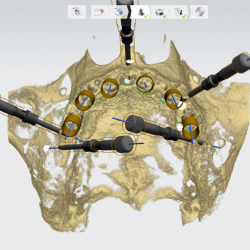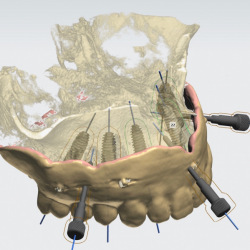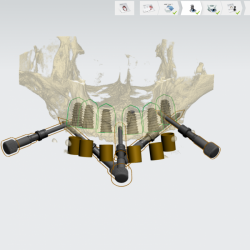The All-on-4 protocol allows restoring the function and aesthetics in edentulous patients and patients whose remaining teeth have to be removed (the offer is valid for the upper and lower jaw).
3D technology and the presence of a high-tech laboratory gives us the opportunity to plan and deliver All-on-4 implants with simultaneous fixation of milled fixed prosthesis.
1st stage – diagnostic!
- 3D computed tomography, digital jaw scan, photo protocol, consultation from a surgeon-implantologist and a prosthodontist, preparing an individual treatment plan (1 day).
Preparatory stage for All-on-4: - 3D planning and modelling of a surgical template and a temporary implant-supported prosthesis.
Printing a template on a 3D printer and milling a bridge.
2nd stage – surgical!
- Installation of implants according to the full protocol All-on-4 without incisions, with simultaneous fixation of a temporary bridge consisting of 10 teeth. Time of stay in the clinic (2 days)
3rd stage – prosthetic!
- Replacing a temporary bridge with a permanent one.
- After 3-6 months (after the installation of implants), a digital scan and the manufacture of a permanent structure (according to an individual treatment plan) are carried out.
Prosthetic options:
- Milled CAD / CAM frame construction with 12 acrylic teeth – implant-supported prosthesis.
- CAD/CAM-milled zirconia implant-supported prosthesis with the application of ceramics in the aesthetic zone.
All-on-4 is an ideal rehabilitation option for toothless patients, especially for patients whose teeth must be removed. The procedure allows you to get rid of removable dentures and significantly improve the quality of life.
As a result of many years of work at the BioDent clinic, the All-on-4 protocol has been perfected to the smallest detail; patients from Germany, Switzerland, Austria, the UK come to us for a high-quality result, which demonstrates a high degree of trust in our team.









 Čeština
Čeština Русский
Русский Deutsch
Deutsch Español
Español

